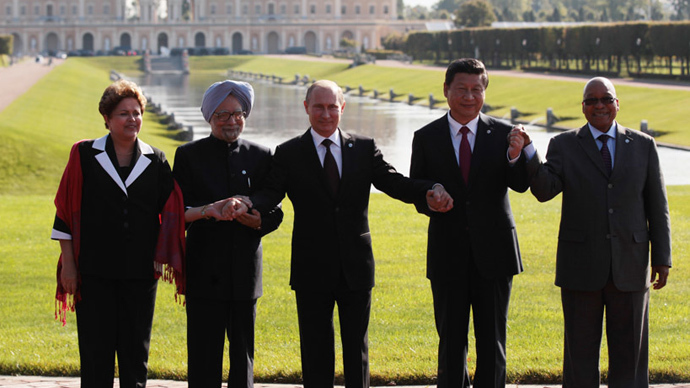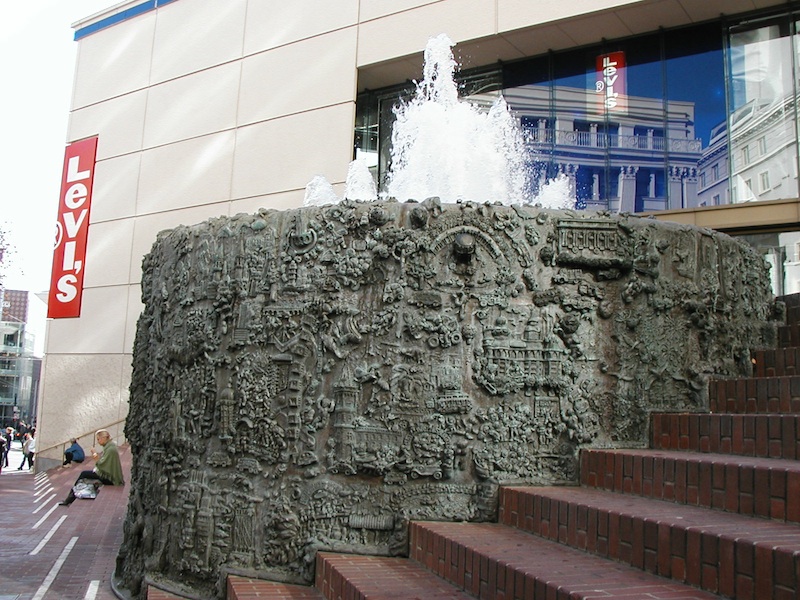As leaders of countries making up half of the world’s population firmly opposed military action against Syria without a UN mandate, the US kept pushing for a strike, claiming that many countries represented at the G20 summit were “comfortable” with it.
Although discussion of the Syrian conflict was never officially on the G20 agenda, world leaders used their statements and speeches to outline their stance on a possible US-led military strike against the government of Syrian President Bashar Assad.
Russian President Vladimir Putin has dismissed the notion that there was a 50/50 split of opinion on the issue, alluding that leaders of the majority of the world’s largest economies clearly stated their opposition to military intervention in Syria.
Russia, China, India, Indonesia, Argentina, Brazil, and South Africa were among the countries that openly spoke out against military action not authorized by the UN Security Council, Putin revealed.
Putin himself said that he believes the alleged chemical weapons attack was nothing more than “a provocation on behalf of the armed insurgents in hope of the help from the outside, from the countries which supported them from day one.”

President of the Russian Federation Vladimir Putin at a news conference on the outcome of the G20 Leaders’ Summit (RIA Novosti / Alexei Druzhinin)
Taking a stand against a US-led strike
During his closing speech at the G20 summit, the Russian President pointed out that the world’s most populous Muslim-majority nation – Indonesia – was among those “categorically opposed” to a strike against Syria.
Indonesia has been calling on the international community to refrain from extrajudicial justice on Syria, and to wait until UN investigators publish the results of their work.
“Indonesia’s stance is clear. President Yudhoyono has said that, while affirming that the use of chemical weapons against innocent civilians cannot be accepted, we need to ensure who actually carried out the attacks. In this sense, we should wait for the UN’s inspection team to announce the result of its investigation,” Indonesian Foreign Minister Marty Natalegawa said in a statement published on President Susilo Bambang Yudhoyono’s official website.
“International responses should not lead to more and worse humanitarian problems. The misery of the Syrian people has been too long and we need to ensure there is no military approach used, but instead peaceful diplomatic measures must be utilized to settle the problems,”Natalegawa added.

Indonesia’s President Susilo Bambang Yudhoyono attends a meeting with Business 20 and Labour 20 representatives during the G20 summit on September 6, 2013 in Saint Petersburg (AFP Photo / Eric Feferberg)
China has consistently opposed a military solution for the Syrian crisis, joining Russia in its belief that any action must be based on the UN investigation and authorized by the UN Security Council.
Chinese Foreign Ministry spokesperson Qin Gang told RT at the summit that it is “vitally important” that any move on Syria be based on the UN investigation, stressing that China is “against the use of chemical weapons by any countries or organizations.”
“China and Russia are both appealing to the countries concerned to be serious about the possible consequences of the use of military means without the mandate of the UN Security Council,” Qin added, reminding that recent history has shown that such means “can’t solve a complicated issue like Syria.”
Meanwhile, China’s vice finance minister, Zhu Guangyao, has warned that a strike would have a negative impact on the global economy and “cause a hike in the oil price.”

China’s President Xi Jinping (AFP Photo / Pool / Alexander Nemenov)
Other members of the BRICS bloc of emerging economies – Brazil, India and South Africa – also voiced their firm opposition to the possibility of a US-led military strike.
Any action on Syria should be taken within the UN framework, and only after the UN releases the results of the chemical weapons investigation, India’s Prime Minister Manmohan Singh stressed.
While condemning the use of chemical weapons by any party, Singh told G20 leaders that one needs to be certain what has really happened in Syria, according to Indian Planning Commission Deputy Chairperson Montek Singh Ahluwalia, who spoke to reporters at the summit.

India’s Prime Minister Manmohan Singh (AFP Photo / G20RUSSIA)
South African President Jacob Zuma slammed the idea of a military intervention in Syria on the eve of the summit, saying that one cannot “remain silent when one country is being bombed to ashes before our eyes.”
Zuma stressed that the UN is “the only authority that can intervene militarily in any country,” in his speech earlier this week.
“We don’t want the world to be run by individuals, but a collective in the form of the UN. I don’t know if people who are questioning our position on Syria have an alternative,” Zuma said.

South Africa’s President Jacob Zuma (AFP PhotoO / Kirill Kudryavtsev)
President Putin on Friday quoted his South African counterpart as saying that the world’s smaller countries feel “increasingly vulnerable and insecure” with the notion that a more powerful nation can “at any time and at its own discretion use force against them.”
In this regard, a military strike outside of a UN Security Council resolution would set a dangerous precedent, Putin warned.
“The use of force on a sovereign state is only possible if it is done for self-defense – and, as we know, Syria is not attacking the US – or under a decision made by the UN Security Council. As one participant in our discussion said, those who act otherwise put themselves outside of law,”Putin said.

| Against military strike |
Population |
For military strike |
Population |
| Russia |
143,400,000 |
US |
316,597,000 |
| China |
1,353,821,000 |
Turkey |
75,627,384 |
| India |
1,210,193,422 |
Canada |
33,476,688 |
| Indonesia |
237,424,363 |
Saudi Arabia |
29,195,895 |
| Argentina |
41,660,417 |
France |
65,350,000 |
| Brazil |
201,032,714 |
Australia |
23,173,142 |
| South Africa |
52,981,991 |
Japan |
126,659,683 |
|
|
Republic of Korea |
50,219,669 |
|
|
UK |
63,181,775 |
|
|
Italy |
59,685,227 |
| TOTAL |
3,240,513,907 |
|
843,166,463 |
*Germany has decided to stay neutral
*EU, a full member of the G20,
does not take a unified stand yet |
|
|
|
Defending a US-led strike on Syria
On the other hand, US President Barack Obama stressed that the situation in Syria might set a dangerous precedent for the world.
During his Friday speech at the G20 summit, Obama said his “goal” and America’s “responsibility” was to maintain international norms on banning the use of chemical weapons, saying he wanted the enforcement to be “real.” He stressed that if the international community does not act, the norms will begin to “unravel.”
Obama then seemingly downplayed the role of the UN Security Council, saying it can end up as “a barrier to acting on behalf of international norms and international law.”
The US has stated that it has “high confidence” that Syrian President Bashar Assad was behind the alleged chemical weapons attack, and that Washington has evidence proving it, with US officials speculating on Assad’s“capabilities” for such an attack. However, neither Russia nor the UN found such reasoning to be satisfactory.

US President Barack Obama (AFP Photo / Jewel Samad)
Seeking international support for a strike against Syria at the G20 summit, Obama openly brought up the issue at both bilateral meetings and in discussions on the summit’s sidelines. The US President’s conclusions on the global opinion contradicted that of President Putin’s.
“I would say that the majority of the room is comfortable with our conclusion that Assad – the Assad government – is responsible for their [chemical weapons] use. Obviously this is disputed by President Putin, but if you polled the leaders last night, I’m confident that you’d get a majority who said it’s most likely, we are confident that the Assad regime used them,” Obama said.
Just as the G20 summit was closing up, the White House promptly published a joint statement signed by the leaders and representatives of 11 nations – ten of whom are G20 members. The signees included Australia, Canada, France, Italy, Japan, Republic of Korea, Saudi Arabia, Spain, Turkey, the United Kingdom, and the United States.
The statement condemned “in the strongest terms the horrific chemical weapons attack in the suburbs of Damascus on August 21,” adding that “evidence clearly points to the Syrian government being responsible for the attack.”
It called “for a strong international response to this grave violation of the world’s rules and conscience that will send a clear message that this kind of atrocity can never be repeated.”
The signatory nations said they “support efforts undertaken by the United States and other countries to reinforce the prohibition on the use of chemical weapons.”
However, another part of the statement clearly contradicted the current American stance on military action against Syria.
“Recognizing that Syria’s conflict has no military solution, we reaffirm our commitment to seek a peaceful political settlement through full implementation of the 2012 Geneva Communique. We are committed to a political solution which will result in a united, inclusive and democratic Syria.”
It also remained unclear whether all the parties shared a common understanding of what constitutes a “strong international response.”
Earlier last week, Italian Prime Minister Enrico Letta stressed that Italy would not participate in a strike against Damascus “if the United Nations doesn’t back it.”
British Prime Minister David Cameron pledged that he “will act accordingly” after British MPs rejected the government’s motion to support a military action against Syria.
Cameron on Friday again hinted at the possibility of bypassing the UN Security Council on the strike, saying that relying on the body whose decision hinges on a potential Russian veto would be “a very misguided approach.”

British Prime Minister David Cameron (AFP Photo / Yuri Kadobnov)
As he expressed his frustration over the divisions at the G20 summit, Cameron stopped short of accusing Putin of being dishonest about the situation in Syria.
“This G20 was never going to reach conclusions on Syria. The divisions are too great…The Russian position that, as Putin has said, if it is proved it is Assad he will take a different view, but he is fairly clear that it is the opposition, is miles away from what I think the truth is and miles away from what lots of us believe,” Cameron said at the G20 summit briefing.
Europe’s biggest supporter of the US-led strike against Assad, French President Francois Hollande, told reporters after the G20 summit that he will rely on the UN inspectors’ report and the decision of the US Congress.
“We shall await the report of the inspectors just as we will await [US] Congress,” he said, promising to do everything he can “so that France only strikes military targets to avoid civilian casualties” if the Syrian strike is launched. Hollande also said he hopes to convince his EU partners to adopt a similar position on Syria.

France’s President Francois Hollande (AFP Photo / Eric Feferberg)
‘Extremely cautious’
According to Putin, Germany – one of America’s key NATO allies – is “extremely cautious” when it comes to a strike against Syria.
German Chancellor Angela Merkel defined her country’s position during the G20 summit, saying that she does not believe military intervention is the answer, and that Germany will support a political solution.

Germany’s Chancellor Angela Merkel (AFP Photo / G20RUSSIA)
The European Commission disagreed with the position voiced by some of the union’s members, saying that the EU does not support a military solution to the Syrian crisis.
“The European Union is certain that the efforts should be aimed at a political settlement,” president of the European Commission, Jose Manuel Barroso, told reporters at the G20 briefing.

European Commission President Jose Manuel Barroso (AFP Photo / Dimitar Dilkoff)



 President of the Russian Federation Vladimir Putin at a news conference on the outcome of the G20 Leaders’ Summit (RIA Novosti / Alexei Druzhinin)
President of the Russian Federation Vladimir Putin at a news conference on the outcome of the G20 Leaders’ Summit (RIA Novosti / Alexei Druzhinin)
 Indonesia’s President Susilo Bambang Yudhoyono attends a meeting with Business 20 and Labour 20 representatives during the G20 summit on September 6, 2013 in Saint Petersburg (AFP Photo / Eric Feferberg)
Indonesia’s President Susilo Bambang Yudhoyono attends a meeting with Business 20 and Labour 20 representatives during the G20 summit on September 6, 2013 in Saint Petersburg (AFP Photo / Eric Feferberg)
 China’s President Xi Jinping (AFP Photo / Pool / Alexander Nemenov)
China’s President Xi Jinping (AFP Photo / Pool / Alexander Nemenov)
 India’s Prime Minister Manmohan Singh (AFP Photo / G20RUSSIA)
India’s Prime Minister Manmohan Singh (AFP Photo / G20RUSSIA)
 South Africa’s President Jacob Zuma (AFP PhotoO / Kirill Kudryavtsev)
South Africa’s President Jacob Zuma (AFP PhotoO / Kirill Kudryavtsev)

 US President Barack Obama (AFP Photo / Jewel Samad)
US President Barack Obama (AFP Photo / Jewel Samad)
 British Prime Minister David Cameron (AFP Photo / Yuri Kadobnov)
British Prime Minister David Cameron (AFP Photo / Yuri Kadobnov)
 France’s President Francois Hollande (AFP Photo / Eric Feferberg)
France’s President Francois Hollande (AFP Photo / Eric Feferberg)
 Germany’s Chancellor Angela Merkel (AFP Photo / G20RUSSIA)
Germany’s Chancellor Angela Merkel (AFP Photo / G20RUSSIA)
 European Commission President Jose Manuel Barroso (AFP Photo / Dimitar Dilkoff)
European Commission President Jose Manuel Barroso (AFP Photo / Dimitar Dilkoff)



